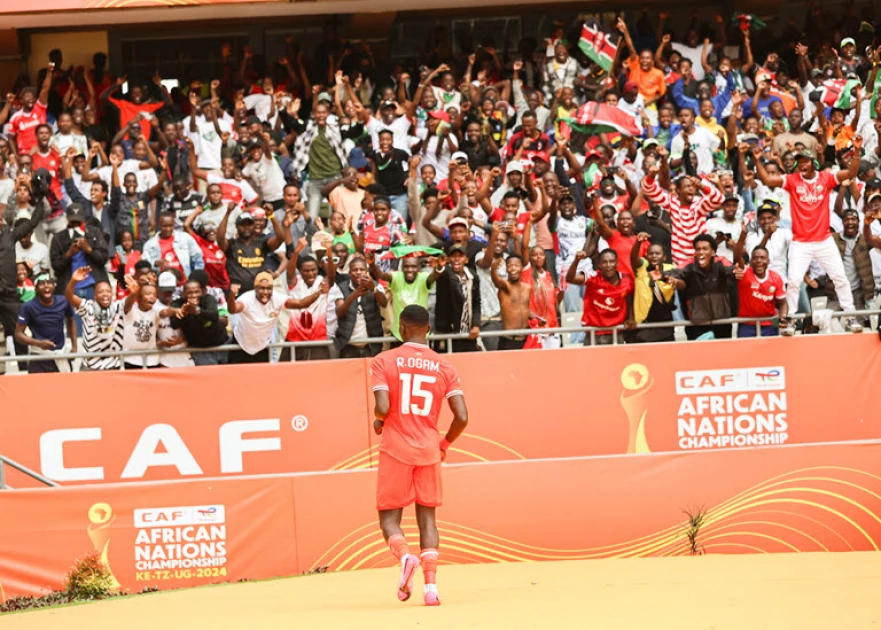OPINION: CHAN 2024 Finale: Crowned in Kenya

Harambee Stars striker Ryan Ogam celebrates in front of fans after scoring against Morocco in their CHAN 2024 Group A match at the MISC Kasarani. Photo by Sportpicha.

Audio By Vocalize
When Kenya, Uganda, and Tanzania came together to bid for the 2024 African Nations Championship (CHAN), it was a bold statement of intent by the three nations to re-imagine what African football could look like when we collaborate, invest, and dream together. That promise has been kept.
Across the region, stadiums have undergone major transformations, having been refurbished to international standards.
From the renowned Moi International Sports Centre Kasarani and Nyayo Stadium in Nairobi, to the nostalgic by Benjamin Mkapa Stadium in Dar es Salaam and Nelson Mandela Stadium in Kampala.
These stadia, once symbols of past glory, have been restored into arenas where new African football stories are being written.
As Africa’s pioneer tri-nation CHAN hosting, the continental experiment has proved an overwhelming success.
The collaboration demonstrates that East Africa, long considered a sleeping giant of African football, could unite, organise, and deliver an event experienced by millions across the continent and across the globe.
The intense logistical coordination - across governments, federations, organisers, and communities was nothing short of historic.
Ultimately, a sense of shared ownership and exciting sibling rivalry was cultivated. What might once have been seen as a gamble has become a model for future continental tournaments.
If there was one undeniable champion of CHAN 2024, it was the fans. Kenya emerged as the heartbeat of the tournament. In Kasarani, crowds thundered as Harambee Stars entered the field.
At Nyayo, the stands pulsed with rhythm and colour. Beyond the stadium walls, official fan zones in areas such as Baba Dogo, Central Business District, Githurai, and Mathare gave tens of thousands more a safe and vibrant way to experience the tournament together.
These fan zones were intentionally set up in strategically organised venues with large broadcast screens, proper seating, entertainment, mobile toilets, and even emergency medical services.
Families turned up, children painted their faces in national colours, and women, who have often been left out of mainstream football spaces, felt welcome and safe.
With the exception of a few initial challenges, the “12th Man Army” of Kenyan supporters embodied discipline and passion throughout CHAN 2024. They turned up in record numbers, celebrated with energy, and did so with remarkable order.
This tournament has showcased that Kenyan fandom can balance excitement with responsibility, setting a new benchmark for football culture defined by discipline, unity, and pride.
On the field, CHAN 2024 has been a showcase of Africa’s local talent. Unlike AFCON, CHAN is reserved for players based in their home countries’ leagues, making it a powerful platform for emerging stars from local and grassroots clubs.
Kenya, making its debut in the knockout stages, captured the imagination of millions and rightly so. From the confident escapes and topping the so-called “Group of Death” to the dramatic quarter-final against Madagascar at Kasarani, Harambee Stars showed that local football has the grit and quality to compete with the continent’s best.
For our neighbours, Uganda and Tanzania, the roar of home fans lit up stadiums, while continental giants brought pedigree and fierce competition.
Every match has been more than just a contest; it has been a story of a nation's passion, the football community’s resilience, and a reminder that sports remain Africa’s most unifying heartbeat.
Beyond the spectacle on the pitch, Kenya has impressed with its meticulous organisation. The quarter-final in Nairobi was a masterclass in event management. Security was layered and family-friendly, ensuring safety without intimidation. Broadcast deals ensured that CHAN reached living rooms from Mombasa to Marrakech, from Lagos to Lusaka.
Local communities were not left behind. Hundreds of marshals and stewards – many recruited directly from the neighbourhoods around the fan zones – were trained and contracted, creating jobs while strengthening trust between organisers and residents.
Small businesses thrived, from food vendors to transport operators, proving that football tournaments are not just entertainment but also engines of economic activity.
For decades, Kenya was considered an unconverted potential in African football. That narrative is changing. CHAN 2024 has placed the country firmly on the map as not just a participant, but as a standard-setter in hosting, organising, and commercialising football.
The outpouring of fans, the success of streamlined ticketing, the seamless security coordination, and the refurbished stadiums have sent a clear message to CAF and the world: Kenya is ready for bigger stages.
Already, investments around AFCON 2027 – such as the Talanta Sports and Bukhungu Stadium – have gained strong momentum, with CHAN seen as a successful rehearsal.
On August 30, the continent’s gaze will be fixed on Kenya. Kasarani will host the final game, a night of coronation not only for the winning team but also for Africa’s renewed faith in football as a force for unity.
From the first whistle in Dar es Salaam to the last in Nairobi, this journey has redefined the possibilities of African football. As the trophy is lifted under the Nairobi night sky, the legacy will be clear: CHAN 2024 has been Africa’s homecoming.
And Kenya, once a hopeful spectator, has become the proud custodian of the crown.
Dr Raymond Omollo, PhD, CBS is the Principal Secretary, State Department of Internal Security and National Administration


Leave a Comment